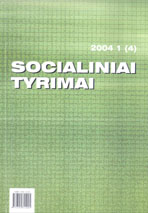Rangavimo ir klasterinės analizės taikymas vertinant Lietuvos regionų hierarchiškumą bei skirtumus socialiniu – ekonominiu požiūriu
The Application of the Rating and Cluster Analysis Assessing the Hierarchy and Differences of Lithuanian Regions from the Social – Economical Point of
Author(s): Jolita Krumplytė, Audronė RimkevičienėSubject(s): Economy
Published by: VšĮ Šiaulių universiteto leidykla
Keywords: Regional policy; regional development; rating analysis; cluster analysis; social – economical differences among the regions.
Summary/Abstract: The aim of the article is to rate the hierarchy of Lithuanian regions with reference to the most important social – economical indicators. Some alternative methods, i.e. rating and cluster analysis, has been described theoretically and put into practice in order to distinguish the antecedences of some Lithuanian regions applying the complex system of indexes, set by the authors. The following conclusions may be presented after analysing the aspects and the actual data of the development of Lithuanian regions: 1) Different problems of organising economics arise on the conditions of market economy, which are especially obvious in problematic regions. The strategy of the development of each region must be built according to the systemic attitude taking into consideration the state of the region and the country, as well as the tendencies of the development; 2) Deceleration and decline of the development of regions are determined by uneven distribution of labour force, capital and investment. This increase the social – economical differences among the regions; 3) The rating of regions should be applied in the early stages of creating regional policy, when it is important to identify the conditions in different regions; 4) Regions should be evaluated in a complex way, i.e. making out separate groups according to social - economical indexes. Cluster analysis makes possible to distinguish separate groups of regions (clusters), allows to carry out the projects and plans in regions and their clusters. It should be stated, that modelling and implementing regional policy every region must be estimated as a separate social – economical system, identifying the most important forces. But regions also should be understood as a part of a bigger system – the country. The realisation of systematic principle in forming regional policy is a complex process, and not only the state of a separate region should be evaluated, but also the whole situation of the country.
Journal: Socialiniai tyrimai
- Issue Year: 2004
- Issue No: 4
- Page Range: 39-48
- Page Count: 10
- Language: Lithuanian

